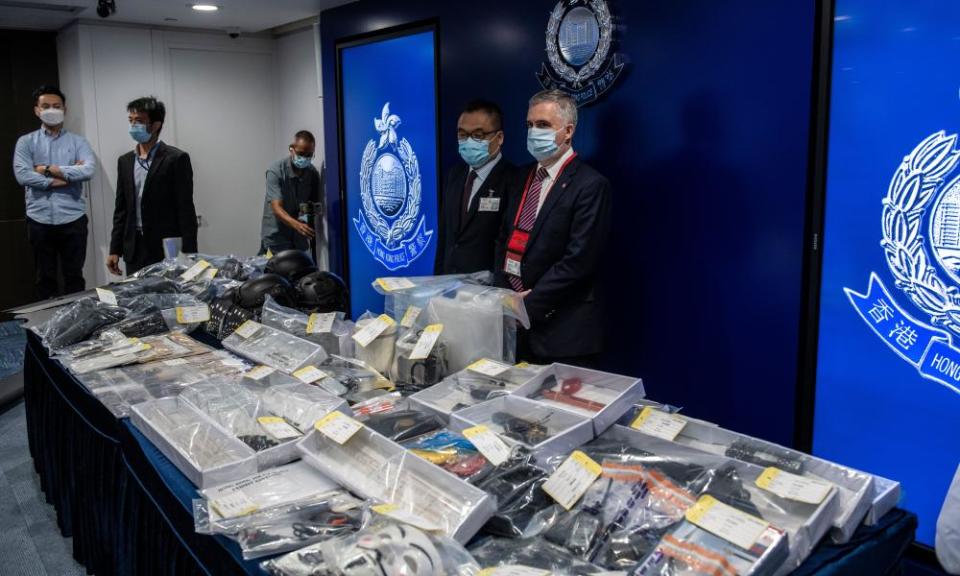Hong Kong police say nine arrested over alleged bomb plot

Hong Kong’s national security police say they have arrested nine people on suspicion of engaging in terrorist activity after uncovering what they described as an attempt to make explosives and plant bombs across the city.
According to police, the suspects were aged 15-39 and included six secondary school students, a teacher, an unemployed person and a management-level university employee.
The suspects were accused of attempting to make the explosive triacetone triperoxide (TATP) in a makeshift laboratory in a hostel. Police said they had seized apparatus and raw materials used to make TATP, as well as a “trace amount” of the explosive. They said they had frozen bank funds of about HK$600,000 (£56,000) as well as cash that they believed was linked to suspected terrorist activities.
Related: Hong Kong police say mourning officer’s attacker is like backing terrorism
Speaking at a news conference, a senior superintendent with the police national security department said those arrested had planned to bomb the city’s public facilities, including courthouses and rubbish bins.
TATP is often used in bombs and improvised explosive devices. In 2019, Hong Kong police said they had seized about 2kg of TATP and arrested a 27-year-old man on suspicion of possessing explosives.
The highly unstable explosive has also been used in high-profile terrorist attacks in recent years. It was found in the Paris attacks in November 2015, the Brussels bombing in 2016, and the Manchester arena bombing in 2017.
Police said the nine suspects belonged to a pro-independence group, Returning Valiant, and that they had been renting the room at the hostel in the bustling shopping district of Tsim Sha Tsui for about a month.
“They had a good division of labour among those arrested. Some of them provided money. Some are the scientists – the ones who made the TATP in the room,” the senior superintendent, Steve Li, told media.
“One is responsible for the sourcing of chemicals and other materials needed for the plan, while another small group of people create the bombs, using chemical equipment. There is also a surveying team and an action team, which is responsible for laying the bombs.”
Related: Hong Kong needs law to tackle ‘hostility against the police’, says force’s new chief
The nine arrested on Tuesday were the latest to be targeted under a sweeping national security law Beijing imposed on Hong Kong last year. The alleged terrorist plot came days after a man stabbed a police officer and then killed himself on 1 July – the 24th anniversary of Hong Kong’s return to China from Britain.
Authorities labelled the assailant as a “lone wolf” domestic terrorist who had been politically radicalised, and blamed people who “incite hatred” against China. The police also told citizens that mourning the death of a man who stabbed a police officer last week is “no different to supporting terrorism”.
Li said on Tuesday that police officers found newspapers in the attacker’s residence that contained “fake news” inciting hatred.
The Hong Kong chief executive, Carrie Lam, urged members of the public to “openly condemn threats of violence”.
She said: “They should not be wrongly influenced by the idea that there is only government tyranny … They should not be influenced into thinking that they can find excuses to inflict violence.”

 Yahoo Finance
Yahoo Finance 